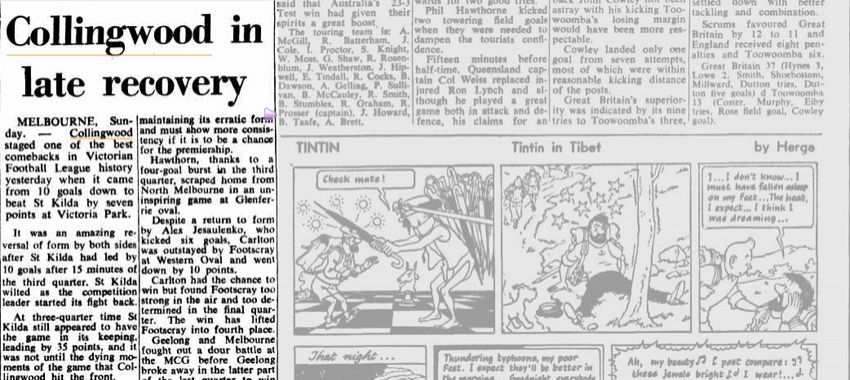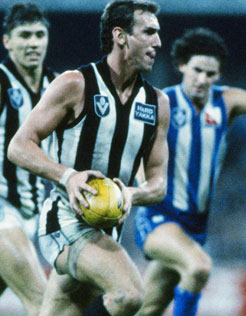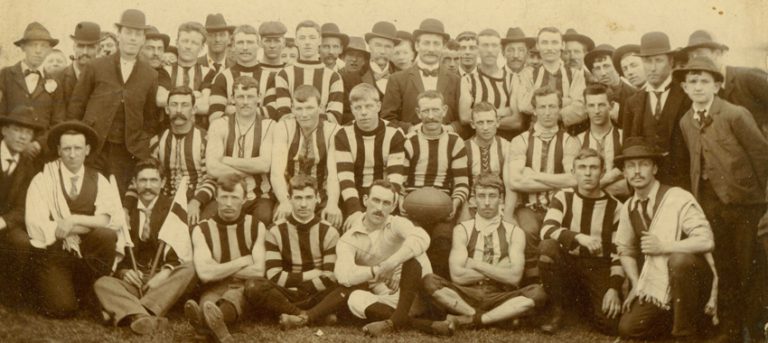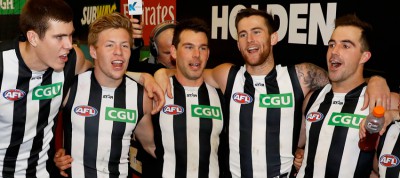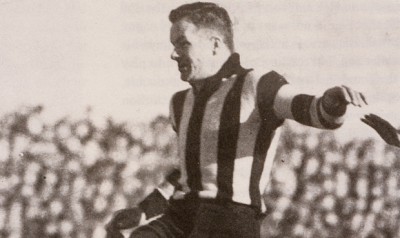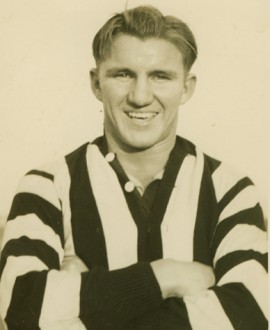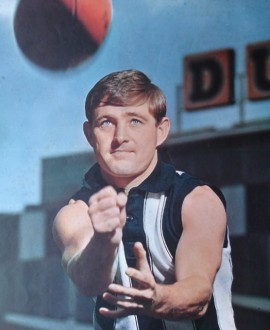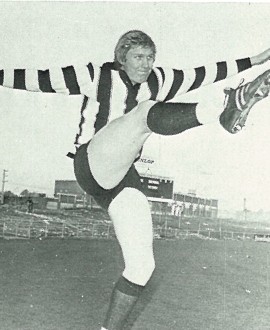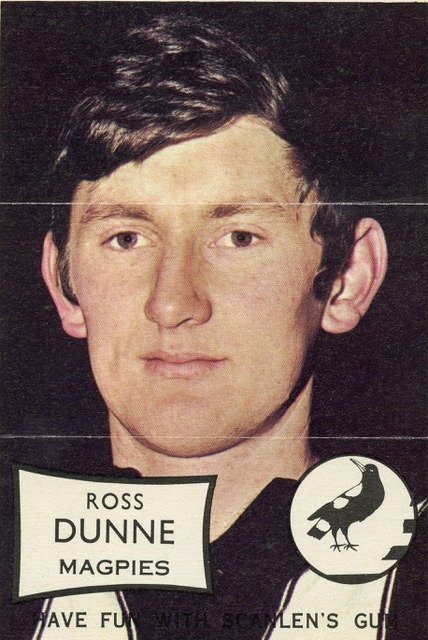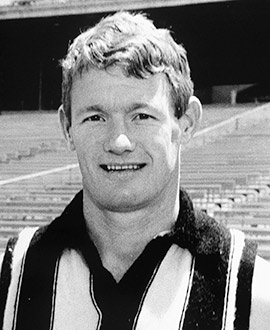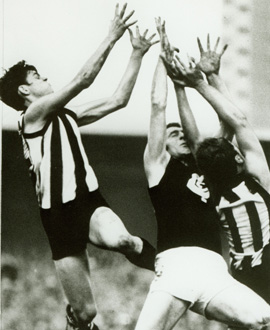By: Glenn McFarlane
IT'S half-time of Collingwood's Round 10 match against St Kilda in 1970 and the normally composed coach Bob Rose is pacing around the Victoria Park dressing rooms like a person ready to unleash hell.
Rose has every right to be angry. He has just sat through the first half of what he would later describe as "the most disgraceful exhibition by a Collingwood side since I have been connected to the club - and that goes back to 1946."
Outside the rooms the crowd of almost 31,000 is gobsmacked that the VFL's flag favourite have been so comprehensively outplayed by St Kilda.
Prior to the game, it had seemed all but a formality. Lou Richards had written in The Sun newspaper: "The Magpies will thrash the St Kilda. They'll make the Saints pay - in bruises, if not in blood."
But the only ones bleeding at half-time are the Magpies after a stunning previous hour. During time-on of the second term the difference had stretched out to 60 points. It could have been worse. A goal to Wayne Richardson just before the half-time siren cut it back to 52 points.
Fast forward another hour and Collingwood had produced the greatest comeback in VFL football to that stage. The 67-point turnaround - the Magpies would eventually win by seven points - would last as a league record for almost 30 years.
It remains Collingwood's greatest comeback and one of the club's most remarkable wins.
Only two sides have since bettered it - Hawthorn (63 points in the second quarter against St Kilda in 1999) and Essendon (69 points down in the second term vs. North Melbourne in 2001).
"The thing that I remember the most about that game was that we copped a real roasting at half-time," McKenna said. "Bob was always a gentlemanly bloke, but he would give us a pay out if we did the wrong thing and didn't perform," Peter McKenna recalled.
Rose admitted after the game that he demanded a better effort from his players: "I told the players at half-time they would be dragged off the ground if they did not contest. I was prepared to fight out the game with 14 men if required. I knew a miracle would have to happen for us to win."
Few people thought St Kilda would be able to trouble Collingwood, who had won the first eight games only to narrowly slip up against Essendon in Round 9.
But as McKenna recalled, the Saints "dominated in the first half ... they were a bloody good side."
That much was apparent by the 14-minute-mark of the opening term, when the difference was out to 32 points, with Collingwood held goal-less.
The Sporting Globe recorded: "Collingwood were falling into errors and they were being 'got-in' by St Kilda's vigour and confidence."
The Magpies could only manage 0.3 to the Saints' 6.6 by quarter-time. Despite boasting an elite attack, including McKenna, who had kicked 45 goals from his seven games so far that season, Collingwood could not manage a goal in the first 50 minutes of play.
It wasn't until the 20-minute-mark of the second term that the Victoria Park scoreboard attendants had to put a one in the Collingwood goal ledger. McKenna was the recipient after a pass from Con Britt. But the bleeding didn't stop there.
St Kilda had kicked 11 goals for the half, and at the 27-minute-mark of the second term, the margin bloated out to a game-high 60 points.
Fortunately, it had been cut back to 52 points by half-time, and as the Collingwood players wandered off the ground, McKenna was certain of two things - a bake from Rose was coming, and that things could hardly get any worse.
"We were a good side, so we knew we could fight back, but I don't know whether we knew we could win," the Magpie full-forward said.
With the words of the coach still ringing their ears and with pride in their performance driving them, Collingwood set about enacting the greatest comeback in VFL history to that stage.
Few people would have recalled it at the time, but the record that McKenna and his teammates were about to grab belonged to their opponents that day.
In 1937 St Kilda had been held scoreless in the first term of its Round 2 clash with Hawthorn at Glenferrie Oval. The difference at that time was 55 points. By the end of the game, though, the Saints stormed home to win by 13 points.
Rose made "wholesale changes" to elicit a response. In the chaotic second term brilliant wingman John Greening had been switched into the centre, while centreman Barry Price went to half-forward. Both went back to their original positions during the third term.
Ross Dunne was pushed deep to the forward pocket; Terry Waters shifted to centre-half forward; Peter Eakins spent time at centre-half back on Carl Ditterich with the pairing clashing heavily at times; while Des Tuddenham came off the ball and into the forward pocket.
McKenna kicked the first goal of the second half to breathe some life back into the shocked Victoria Park crowd, and the Sporting Globe wrote that "the Magpies were playing rejuvenated football and they swarmed into attack."
McKenna kicked three goals for the term, with others coming from Eakins and Tuddenham, though St Kilda managed three goals to make it 35 points at the last change.
Rose could sense his team had a sniff of victory as he spoke to them for the last time, though he knew it would still require a massive last half hour.
The Sporting Globe described what happened next as: "a miracle". The Magpies kicked 7.7 to 1.1 to produce a "staggering" comeback.
McKenna bagged his fifth goal - his 300th overall - while Wayne Richardson made the difference 14 points at the 17-minute-mark. Colin Tully cut the deficit to seven points soon after, thanks to a nice tap on from Tuddenham.
Wayne Richardson, whom McKenna labelled as one of the most underrated footballers he played with, turned on some more brilliance. He kicked two more goals late in the match, with one of them giving Collingwood the lead for the first time since a brief moment in the opening term.
Then, just as natural order appeared to have been restored, St Kilda had one last rally. Daryl Griffiths stole the lead back with a goal that silenced the parochial Collingwood crowd, dulled by the cruel twist that this game had taken.
But there was one last act left to be played out, and for the home crowd, it was a good one.
With time evaporating, Wayne Richardson stepped forward for the most important kick of the match. He took a mark 20 yards out and slotted it through, putting Collingwood ahead again. Two Magpie points followed before the siren ended on a memorable victory dragged from the jaws of defeat.
St Kilda's rooms were "icy cold" for two reasons. Coach Allan Jeans was shattered by the result and many Saints officials were furious that the home side had received 16 of the 22 free kicks awarded in the last term.
Rose was relieved more than anything else.
The "miracle" that he had requested at half-time had occurred, though he was so disappointed with what happened in the first half that he banned kicking the ball at training on the following Tuesday night. It was a handball only session.
He explained to reporters braving the Victoria Park chill: "Our handball was simply non-existent in the first half on Saturday - so I made it compulsory tonight."
There is a bittersweet irony in all that.
It was the use of handball and a similarly audacious comeback that prevented Collingwood's star-studded 1970 side from claiming the very thing that seemed to be their destiny - the premiership cup.
Having beaten Carlton three times during that famous season, Collingwood turned in a brilliant first half that saw the Magpies take a 44-point lead into the half-time break of the Grand Final.
It seemed as if the flag was headed to Victoria Park for the first time in 12 years. It wasn't. Black and white fans would have to wait for another two decades.
As we all know, Carlton coach Ron Barassi helped to inspire the Blues' fight back at half-time, urging them to handball and to take the game on. They did, and the rest is history. Carlton won the Grand Final by 10 points.
That still pains McKenna: "We should have won that flag that year - it seems cruel that we didn't."
